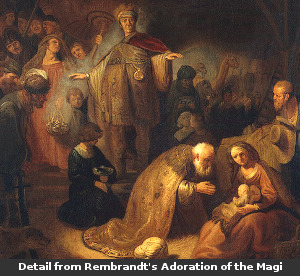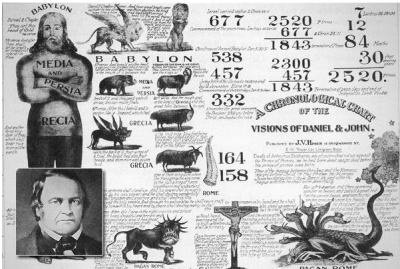Problems With Preterist, Historicist and Covenant Theology
In reviewing the many threads on here where the issue of dispensationalism seems to always end up being a side discussion, I figured I’d start a thread on the 3 major eschatological theories that are gaining popularity that seem to have at least one thing in common, disdain or disregard for dispensationalism and futurism, particularly where it comes to the rapture of the church, and the place and role of Israel in the Bible. The 3 views are Preterism,Historicism and Covenant Theology (which I will commonly refer to as the “3 views” even though some may overlap).
Discussion
What Guided the Magi?

Previously (Part 1) we looked at a few myths surrounding the visit of the Magi to the child Jesus in Bethlehem. We questioned the ideas about the sources of their knowledge of the star and the “King of the Jews” as lying in astronomical phenomena or in astrological “signs.” What is an alternative explanation for their knowledge?
It is possible that the oracles of Balaam served as the source for their expectation of a Jewish king. Of the four oracles delivered by that fascinating man from beyond the Euphrates River (Num. 22:5), the last is most expressive: “I see him, but not now; I behold him, but not near: a star shall come out of Jacob, and a scepter shall rise out of Israel” (Num. 24:17). It is possible that the Magi from Persia had preserved the words of their “ancestor” Balaam and remembered his ancient prophecy when a “Star” did appear out of Jacob. Mention of the scepter also echoes an earlier Messianic reference in Gen 49:10.
An even stronger source for the Magi’s scriptural knowledge comes from the Book of Daniel. In the LXX Greek translation (Dan. 2:2,10), one of the words translated “wise men” is the same as the Greek word used in Matthew 2 (μάγοι/magoi). These Magi in ancient Babylon served as a religious caste in the state religion. One of their functions was to interpret dreams—a role in which they failed miserably in Daniel 2:1-13. Note Daniel 2:13—“So the decree went out, and the wise men (Magi) were about to be killed; and they sought Daniel and his companions, to kill them.” Therefore, Daniel and his three friends were associated with the Magi due to their God-given ability (Dan. 1:20-21). When Daniel accurately interpreted Nebuchadnezzar’s dream (Dan. 2:17-45), he was rewarded with an even higher position among them: “Then the king gave Daniel high honors and many great gifts, and made him ruler over the whole province of Babylon and chief prefect over all the wise men (including the Magi) of Babylon” (Dan. 2:48).
Discussion
Myths of the Magi

The visit of the magi to the Child-Messiah, recorded in Matthew 2:1-12, is one of the most familiar biblical scenes to most Christians.The perception of this event has been unfortunately marred by a large number of popular misconceptions. Some of these derive from the popular song, “We Three Kings of Orient Are.” Consider the following list of erroneous assumptions about the magi:
- They were three in number.
- They were kings.
- They were from the Orient (i.e, the Far East).
- They were named Caspar, Melchior, and Balthazar.
- One of them was a black man.
- They visited the baby Jesus in a stable.
- They followed an astrological or astronomical phenomenon to Bethlehem.
All of these ideas compose what might be called the mythology of the magi. Some of the misconceptions can be corrected by simply reading Matthew 2:1-12. Others can be dispelled by a logical reading of the text giving attention to its Jewish background.
Discussion
Miraculous Gifts: If They Ceased, When?

This study of cessationism considers three essential questions. Focusing on the gift of tongues, Parts 1 and 2 addressed the first of these: What were the gifts in the New Testament, and how does that biblical description compare to what is happening in contemporary charismatic circles? When we approach the continuationist/cessationist debate by first defining the gifts biblically, it becomes apparent that modern charismatic practice does not match the New Testament phenomena.
The second essential question is the when question. If the miraculous gifts (biblically defined) are not occurring in the church today, then does the Bible provide indications to when those gifts ceased?
For the sake of space, this question will be addressed only briefly. Those interested in further study on this issue should read Satisfied by the Promise of the Spirit by Thomas Edgar.
In interacting with the when question, six texts must be considered. Many of these texts are used by continuationists to argue for the ongoing nature of the charismatic gifts.


Discussion